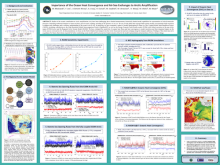Importance of the Ocean Heat Convergence and Air-Sea Exchanges to Arctic Amplification
Wieslaw
Maslowski
Naval Postgraduate School
Poster
Studies of the oceanic contribution to Arctic amplification (AA) have been challenging due to limited measurements, historically limited model capabilities for representation of critical mesoscale processes controlling northward transport of mass and heat, and air-ocean coupling, including in the presence of sea ice. We use several global and regional Earth system models at increasingly high resolution to address such challenges and to advance understanding of the ocean’s role in AA. In particular, we have examined a subset of models participating in Phase 6 of the Coupled Model Intercomparison Project (CMIP6), including contributions to the High Resolution Model Intercomparison Project (HighResMIP) as well as the Energy Exascale Earth System model (E3SM) with refined resolution in the pan-Arctic region (E3SM-Arctic) and the Regional Arctic System Model (RASM). We have evaluated the sensitivity of oceanic heat fluxes and heat convergence to model resolution and their integrated impact on the Arctic sea ice cover and on AA. In this presentation, we focus on the North Atlantic heat transport into the Arctic Ocean and air-sea heat exchange along the transport pathways. Findings of this study may serve as guidance for future observations required for better constraining ocean models and for process-level improvements critical to the model representation and projections of Arctic climate change.

maslowski-wieslaw-polar-poster.pdf
(5.53 MB)
